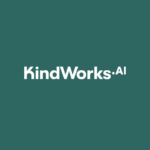Summary
- AI’s Role: AI has become increasingly influential in business, but its impact depends heavily on human contributions.
- Human Advantage: Power skills, such as empathy and kindness, are uniquely human and essential for effective AI collaboration.
- Human-Artificial Intelligence Partnership: Successful businesses are leveraging both human and AI strengths to drive innovation, improve efficiency, and foster a more human-centered approach to technology.
KindWorks.AI is a company that helps leaders unlock the full potential of their people through Kindness. Book a demo and see how Kindness can revolutionize your current team.
Though Artificial Intelligence (AI) has been around for some time, recent breakthroughs have completely transformed its capabilities and scope. Today, AI dominates conversations in corporate boardrooms, becoming more popular and influential for business leaders and cementing its role as a crucial factor for future organizational success. Yet, its rise brings many uncertainties with it. As we discussed in our white paper, “Kindness and the Power Skill Era: Understanding the Importance of Human Connection in the Age of AI”, the debate around the role of AI today, how it will that evolve over time, or how will humans and AI collaborate in the future workplace remain opened.
Underlying these dilemmas for decision-makers, there is an unshakable fact: behind every AI system stands a person. From its design to its implementation and evaluation, human input is vital at every step. The effectiveness of AI systems, therefore, still depends heavily on human contributions. This creates a positive synergy where human expertise helps shape AI, while AI, in turn, supports people in improving their businesses, communities, and individual growth. Such remarkable synergy, however, depends on understanding AI’s limitations and recognize the skills that only humans can bring to the table.
Power Skills: The Key Human Advantage
This is where Power Skills, such as genuine empathy and Kindness, become invaluable. These uniquely human traits cannot be truly emulated by machines, only mimicked in the best – and not real yet – scenario. This is because AI Kindness and empathy comes from the depth of intangible human compassion, intuition, and emotional intelligence and not from a vast amount of data. The ability to understand the immeasurable and forge deep, meaningful connections is what allows people to elevate AI and create impactful results.
Artificial Intelligence, as we from KindWorks know really well, can help us sharpen these Power Skills and empower humans to be better. The results people and companies desire, however, come from a team that is engaged, collaborative, and connected. Such fact opens room for the Human-AI collaboration that highly growth-oriented companies are relying on.
A New Era of Human-Artificial Intelligence Collaboration
By leveraging the strengths of both humans and Artificial Intelligence, businesses can dramatically improve their performance. This type of “collaborative intelligence,” which blends human creativity, leadership, and emotional skills with the speed and analytical prowess of AI, is the key to thriving in this new era. And this is not a perception or a logical exercise. A survey of more than 1,000 companies across various sectors confirmed that embracing human-AI collaboration leads to faster operations, cost savings, and higher revenues. Another study, now involving over 1,500 companies, found that those who successfully integrated human and machine collaboration saw a significant boost in performance. This teamwork allows organizations to innovate more quickly, cut costs, and increase revenue by combining the best of both worlds.
To enter this era and truly benefit from this partnership, businesses must take an active role in shaping their AI strategy. This involves rethinking traditional processes to integrate AI, responsibly managing the data that powers it, redesigning job roles to focus on both human and AI strengths, and encouraging employees to experiment and engage with AI-driven technologies. Organizations that adopt these strategies are not only improving efficiency but also fostering a more human-centered approach to technology.
Kindness and Connection in the Hybrid Workplace
The shift to fully digital or hybrid workplaces in the aftermath of COVID-19 has brought both benefits and challenges. One major drawback has been the loss of those brief, face-to-face interactions that used to provide us with mood-boosting serotonin. In a virtual world, it’s easy for people to become distant and feel like mere pixels on a screen, a phenomenon often reflected in the impersonal tone of social media conversations.
This emphasizes the growing importance of Power Skills, particularly Kindness. By prioritizing kindness and empathy in our interactions—whether in person or online—we can ensure that, even in a highly digital environment, the human element remains strong and vibrant.
The future of work won’t be about AI replacing humans. Instead, the most successful companies will be those that foster effective partnerships between people and machines. AI will continue to provide the speed and data-driven insights that businesses need to stay competitive, but it is human creativity, kindness, and emotional intelligence that will drive meaningful innovation. By embracing both human and technological strengths, we can create a future where businesses flourish and individuals thrive.
KindWorks.AI is a company that helps leaders unlock the full potential of their people through Kindness. We seamlessly increase well-being, productivity, and results with your current team. Want to know more? Book a demo and see in real life how Kindness can be the key to revolutionizing your workplace.

